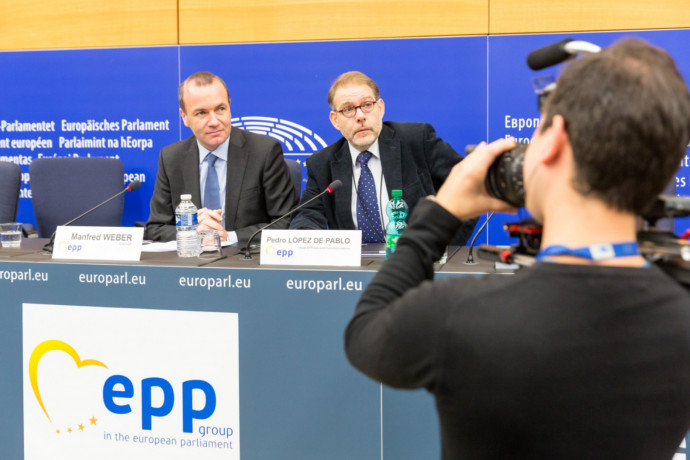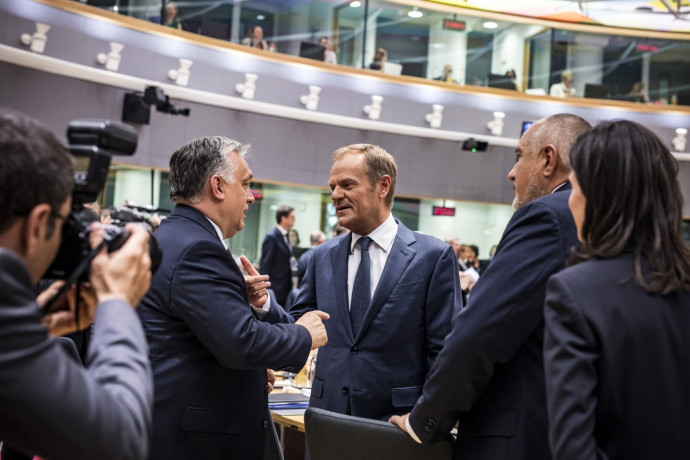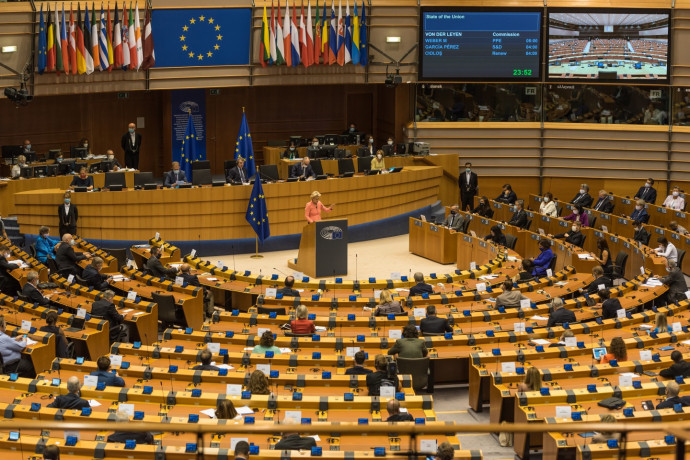EPP: We will convince the Hungarian government about rule of law conditionality

"We will convince the Hungarian government that the system laid down in the rule of law regulation does not only respect the agreement made in the Council in July, but it is also not a partisan mechanism," the Communications Director of the EP group of the European People's Party told Telex. Pedro Lopez de Pablo says the EPP will not give up on the rule of law conditionality, and the membership of Fidesz is still very much on the political family's agenda.
Rumours circulating in Brussels suggest that the debate around the EPP membership of Fidesz has heated up again after on Monday, Viktor Orbán's government had announced a political veto against the European Union's next 7-year financial framework, the 750 billion euro Next Generation EU COVID-19 recovery package, and the rule of law conditionality. At Thursday's EU summit, government leaders had engaged in an intense debate on the matter, but statements made by EPP President Donald Tusk and parliamentary group leader Manfred Weber also suggest internal tensions are boiling in the political family, while European politicians of Fidesz have clearly turned against their Brussels partners on the matter.
We requested an interview from EP group leader Manfred Weber to clear up this situation, but due to his busy schedule, our questions were answered by Pedro Lopez de Pablo, the press officer of the EPP's parliamentary group.
Telex: Will there be consequences for Fidesz in the EPP Group for the party's MEPs rejecting the legislative process concerning the regulation on the rule of law conditionality?
Pedro Lopez de Pablo (PLP): No. The position of the Group, as its Chairman, Manfred Weber said, is in favour of the proposal. National delegations that have a different opinion can vote in a different manner. In the European Parliament, there is no such system that sanctions MEPs who do not follow the group's line of vote.
Telex: What is the position of the EPP regarding the budget veto announced by the Hungarian government, therefore, by Fidesz?
PLP: We expect to convince the Hungarian government that the system agreed not only respects the July agreement of the European Council concerning the respect of the rule of law, but also is a not partisan mechanism because it ends with a Council decision that can be contested in the European Court of Justice.
Telex: So there would be a legal remedy against the rule of law mechanism. After Monday's veto announcement, Manfred Weber tweeted that: "If you respect the rule of law, there is nothing to fear. Denying the whole of Europe crisis funding in the worst crisis since decades is irresponsible." Does he think that the Hungarian and Polish veto could push Europe into a crisis? What kind of crisis would this be: institutional, moral, economic or social?
PLP: The coronavirus pandemic has severely disrupted society and the economy in Europe. The €1.8 trillion package agreed in July was the EU's response to that crisis. Delaying its implementation will only harm those most affected by the crisis. The EPP Group expects that the European Council arrive at a solution that does not delay the process.
Telex: What is the position of the EPP Group in the European Parliament: would you also support a compromise that does not include the rule of law mechanism?
PLP: No, we support the mechanism agreed in the trilogue with the German Presidency, as we have clearly stated yesterday, together with the majority of the political groups of the European Parliament.
Telex: The EP Presidents' Conference has previously made it clear that it insists that the use of EU funds from the next budget cycle be subject to strong rule of law conditions. Why is this necessary, according to the EPP Group?
PLP: The European Union needs an efficient mechanism to guarantee that the colossal resources devoted to alleviate the coronavirus crisis are only given to countries that respect the rule of law according to the values expressed in the Article 2 of the Treaty.
Telex: Does this also mean that the EPP and its EP group would stick to the rule of law conditionality and would refuse an MFF and an NGEU proposal that excludes it?
PLP:The EPP Group considers the three proposals as a package and we will vote on the three texts together.
Telex: What is the next step, what is the position of the EPP at this stage of the budget negotiations?
PLP: Our position is clear, we support the three texts agreed during the negotiations with the German Presidency. We are now waiting for the final position of the Council to vote on them in the Plenary. We do not want to reopen the negotiations with the Council on any of these three texts.
Telex: What is Manfred Weber's personal opinion about the fate of Fidesz within the EPP?
PLP: The Group will follow the decision that has to be taken by the EPP Party, once the Political Assembly can take place – as the EPP party president Donald Tusk explained, the vote on the membership of a party cannot take place via videoconference.
Telex: Is the expulsion of Fidesz on the agenda again?
PLP: It is on the agenda of the Party as there have been 13 national parties requesting a vote on such a decision. According to the rules of the Party, the President shall put that motion to a vote at the next Political Assembly, when one can take place.
Telex: Do you think Fidesz still has a place in the EPP?
The decision belongs to the members of the EPP Party.

Once the pandemic is over
The EPP had suspended the membership of the Hungarian governing party in March 2019, but Fidesz could continue work in the political family's parliamentary group undisturbed. In the meantime though, the stark debate around Orbán's party went on as well, since the Hungarian government's handling of the coronavirus, or at least its main alleged directions, were widely criticised.
During the summer, for instance, Donald Tusk and other members of the EPP condemned the Hungarian Coronavirus Act because they believed it was "an unquestionable affront to liberal democracy and European values," as the Government declared a special legal order with no sunset clause, practically allowing the government to rule by decree due to lax limitations on emergency powers. The second time around, in November, the act on emergency powers did include a ninety-day expiration period, which was a major gripe on the EPP's part as well. During the summer, Orbán wrote a letter to Tusk stating that he is all caught up in saving Hungarian lives and help the country out of an economic and social crisis, adding that they should have talks about Fidesz's EPP membership "once the pandemic is over."
Not long after Orbán's letter, Tusk announced that the EPP's 28 September assembly would not vote on Fidesz's membership, as it was held online, therefore the secrecy of the vote would have been compromised. Despite that, Fidesz fought its way back onto the EPP's agenda by announcing to block the EU's seven-year budget and the COVID-19 recovery package over the rule of law conditionality of EU funds. The fate of more than 1800 billion euros now hangs in the balance, nearly half of which is the coronavirus recovery package meant to alleviate the economic damages of the pandemic.
Political and economic checkmate
The situation is not so clear now, because there may be a political (informal) veto, Hungary and Poland could not block the rule of law mechanism which was already adopted by a supermajority of the European Council, where government leaders from the EPP also supported the initiative, just like their MEPs did in the European Parliament – with the obvious exception of Fidesz's representatives. At the same time, group leaders and the President of the European Parliament have convened on Wednesday, and called on the European Council to stick to their original concept:
"The agreements reached on both the Multiannual Financial Framework and the regulation on Rule of Law conditionality are a closed deal and can in no way be reopened,"
– their statement issued after the Conference of Presidents reads, reaffirming the EP's earlier position on the 7-year budget and the rule of law mechanism.
On 16 September, the European Parliament had already adopted the legislative opinion on expanding EU revenue sources, the so-called Own Resources Decision, giving the Council and the member states enough time to ratify the proposal by the end of the year. However, the regulation on the rule of law criteria must still be adopted by the EP Plenary, which may happen next week, and as statements made by officials let on, it will.

Nothing special
But the Hungarian government had not even hinted at any intentions to ratify the rule of law regulation. On Friday morning, PM Viktor Orbán said that George Soros "basically gives orders to Brussels bureaucrats on what they need to do," referring to the latest op-ed written by Soros on Project Syndicate and the criticism he faced in Europe following his veto announcement, but he added that debates around the budget and a negotiation process that takes months are only natural,
"I don't see anything special here."
But a stalemate seems to have developed, well illustrated by the fact that the Polish-Hungarian veto only took away 15-20 minutes from the informal EU summit held on Thursday night. Here, EU leaders participating in the conference call tasked German Chancellor Angela Merkel with finding a solution that is acceptable to all parties. Concerning the budget and the rule of law mechanism, German Chancellor told reporters after the meeting:
“I also made it clear that I believe we found a very good and balanced compromise.”
Merkel added that negotiations with Poland and Hungary are still ongoing, and so far, they haven't been looking for alternative solutions to the adoption of the budget and the recovery plan. Ursula von der Leyen, the President of the Council said it is pressing that an agreement is quickly reached since the crisis is severe.
But all concerned parties remain silent about what precisely this agreement would be about. A reassuring solution to the Polish-Hungarian veto will have to wait, the final decision is likely to be made on the EU leaders' summit on 10-11 December.